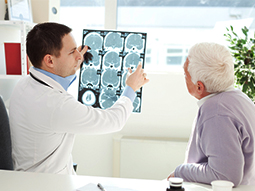Movement disorders are a group of neurological disorders that affect the motor and movement systems of the brain, most commonly an individual's speed, quality, and ease of movement. The group includes:
-
Parkinson's disease: a chronic, progressive, neurodegenerative movement disorder of the brain characterized by tremors (shaking) and difficulty walking, moving, and coordinating.
-
Huntington’s disease: an inherited brain disorder that results in the progressive loss of physical control and mental faculties. Symptoms can include:
- Personality changes, mood swings, and depression
- Forgetfulness and impaired judgment
- Unsteady gait and involuntary movements
- Slurred speech and difficulty swallowing
-
Dystonia: a movement disorder characterized by involuntary, continual muscular contractions. It can result in twisted, contorted postures of the body or limbs. Movements are usually slow and may appear exaggerated. The many causes of this movement disorder include biochemical abnormalities, degenerative disorders, psychiatric dysfunction, toxins, and drugs.
-
Essential tremor: the most common movement disorder and is characterized by rhythmic shaking, which occurs during voluntary movement (action tremor), such as lifting a cup to one's mouth, or while voluntarily maintaining a position against gravity (postural tremor), such as reaching or extending one's hand or arm. It is less common when at rest.
Disorders such as these often have varied symptoms, appearing at different times, which seem unrelated. Because of this, the specialists at MedStar Health provide detailed, comprehensive evaluations that lead to a more accurate diagnosis, as well as individualized treatment plans tailored for each patient.
Our multidisciplinary teams consist of:
-
Neurologists
-
Neurosurgeons
-
Neuropsychologists
-
Neurophysiologists
Working together, these doctors work to improve a patient's quality of life by finding the right combination of therapies, which may include:
- Physical and speech therapy
- Exercise regimens
- Medications >
- Botox injections
- Deep brain stimulation
Our providers

Expert neuroscience care
Getting the care you need starts with seeing one of our neurosurgeons.









